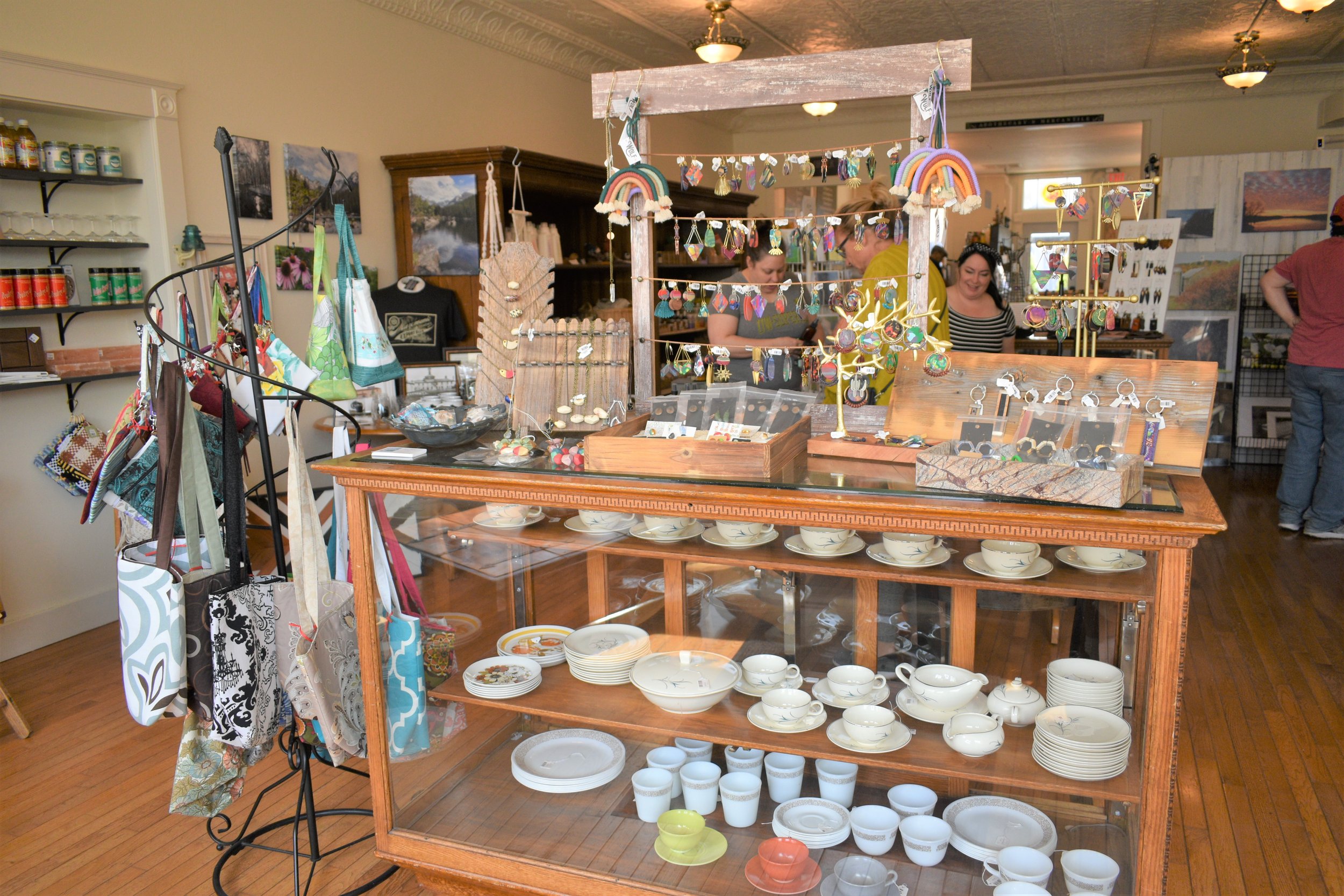Wisconsin Dells musician: Marc LaMere
With the unofficial end of Summer in the Dells marked by Labor Day, if you went to any number of eating venues during the summer season, there is a good chance you caught musician Marc LaMere jamming out.
Like I say, everyone has a story. This is Marc’s.
Marc plays surrounding venues like Monk’s Bar and Grill, Ravina Bay, Vennebu Hill, Nautical Coffee and Balanced Rock in Baraboo, to name a few. His sound and singing are crafted after years of singing and performing, not with a band, but by himself. See, Marc uses what is called a looper. According to emaster.com, Looping means repeating part of a song using a looper device (electronic device), pedal, or plugin. The term "looping" originated with reel-to-reel tape machines. Before digital audio, engineers recorded bands on reel-to-reel tape. They would make a loop out of a section of tape and feed it through the tape machine, playing it back repeatedly, then recording the playback. Nowadays, you can simply cut and paste parts within your digital audio workstation and then record as many takes as you want. However, back when the analog tape was the standard format, you had to physically cut the tape with a razor blade and splice it back together with tape to make any edits.
Marc starts out his songs recording all the parts and rhythms he needs. Along with added guitar playing and his very distinct voice, he creates a musical Cacophony lending his own twist on his covers by multiple artists. To me, in order to record different guitar parts, knowing when to add or take them out, while singing takes talent, skill and a lot of time.
Growing up, Marc recalled there were always guitars around his house. “My mother played guitar. Her and her sisters had a singing group, back in the 50s and 60s, something like that.” At the time Marc admitted his mom playing guitar just wasn’t something a mom did. But the guitar playing would become cool to him. “I was in Arizona. We were visiting some friends when I was like 12 or 13. That’s the first time I heard Stevie Ray Vaughn. My friend put on a CD and he ran to get some lunch or something. The album was ‘Couldn't Stand the Weather’ by Double Trouble and Stevie Ray Vaughan. I just was like blown away; I didn't know guitars could sound like that. I knew my mom was a Hendrix fan, but I didn't hear it in the house. Her record collection was cool, but it was very, like, eclectic. There were albums by Three Dog Night, The Doobie Brothers, Aretha Franklin, and she also had the sound track to 2001 a space odyssey. There wasn't a specific genre that she listened to, and even those records she had, like they weren't played in the house, they were just there. But, after hearing Stevie Ray Vaughan, I got interested in music.” It would be another year though before Marc would pick up a guitar.
It was Christmas or Thanksgiving, he couldn’t recall which, he picked up the guitar and was just messing around to just pass time. Marc said he didn’t really pick anything up from picking up the guitar that night, but said it definitely was the jumping off point for him to want to play music.
Through high school, Marc shared he wasn’t in any garage bands, and besides, at that time there really weren’t too many places that featured bands. “Like now like you can go into almost any restaurant in town and there's live music but when I was first learning, I didn't know of any gigs happening. I know there were a few bars that would have country bands, but there wasn't really a music scene. I think the first band I played with was a native band out of Nebraska. I don't know how they ended up in Reedsburg. But they were doing shows, playing in Reedsburg, and I don't know how it happened, but I did a few shows with them. We played a dive bar in Black River Falls. That was the first time I ever played with other musicians, because up to that point I was just noodling at home. It would be years before Marc would start doing his solo shows.
Marc found a guitarist that caught his attention, Kaki King. King would inspire him to work on solo guitar playing. “She's a fingerstyle guitar player and she doesn't do a lot of singing. To sell out big venues, with just an acoustic guitar, with no singing, she was amazing. she's the first musician I'd ever seen that used a looper. That blew my mind, because to that point, I was trying to figure out how to do arrangements by myself because I didn't have the other musicians to work with. I didn't know it was a thing. Using a looper changed the trajectory of me playing shows. I wouldn't be playing solo shows if I hadn't seen that.”
Marc likened using a looper to a bowl of Ramen. “Yeah, cuz like the cool thing about a looper is it's like a bowl of ramen. The broth is the base or original chord progression, and then everything you add on to it is the seasoning,” he said with a chuckle. Marc said when YouTube first came out, he would watch solo guitar artist Kaki King’s videos. “Eventually around 2006, I purchased my first looper.”
After watching Marc play at several venues, I was, to say the least, impressed. I told him, to me, in order to lay down several guitar tracks, add some hand thumpin’ percussion, sing and play live guitar while keeping it flawless, at the very least takes skill, but also raw talent. Laughing, Marc kept it humble saying, “Well, I think it's just having a lot more free time than most musicians. If you set your mind to something, and you have enough free time you can get good, like all of like the greatest guitar players or any musician really. People have this persona; once people know who they are, that they're just the coolest cat, but the reality of it is, if Eddie Van Halen had a life outside of his bedroom, he wouldn't have been the guitar player he was. Stevie Ray Vaughn revealed in almost every interview they ever had with him; he would say he played in his room 12 hours a day for years.”
At the time loopers were hard to find. Marc recalled he had to drive to LaCrosse to purchase his first one. “They were hard to get because nobody was using them. They weren't in Guitar shops. I found out later, that Dunlop was making rackmount loopers back in the 70s, and there was only like two guys on the planet using them. So, they stopped making them for a while. In the 80s they decided to put them in a stomp box and then loopers slowly started getting into like the lexicon of musicians using them.”
Using a looper, Marc found he could do the whole song by himself in his room, so he could practice to it. He pointed out that he learns different parts of a song through listening. “I can't read music, but, if I hear a song enough, it'll come out on its own, not when I want it to. Like, if I hear, I can't remember what I was listening to, I think it was a Stevie Wonder song. I had it playing on repeat while I was working on a different song. All of a sudden, the chord progression for the Stevie Wonder song started coming out while I'm playing something I thought I was writing. I'm like, ‘oh, I'm not writing this song, it's a Stevie Wonder song’. So, that's how music comes for me. I know some guys that can hear it and then instantly play it.”
Over the past few years, Marc has built up a following. At just about every gig he plays someone will come up to him and say they were there just to hear him play. Marc is a humble guy though. “You hope that happens. I know some musicians around town that have, like 10-15 people show up to every single gig they play, and if they play six days a week, those people are gonna show up six days a week. That to me is baffling.”
Building his own following of those that appreciate his talent, Marc said just kind of happens. “I'm genuinely surprised when people show up that saw a post of, or know where I'm going to be playing. That actually happened last night. This lady and her sister or her daughter, were trying to find out where I was playing. They saw that I was playing at Vennebu Hill, I think their website posted it or something. They were already needing to come to Vennebu because they're having a wedding there in like two weeks or something. But I think things like that are cool for sure. For me, if I'm being paid to do something, I want to do it the best I can.”
I asked Marc if his Native American (Hoocąk) culture played any role in his music. He was quick to reply that he does not mix the two. “When I first started doing shows, I would sometimes get booked to play cultural events. I don't think they mix you know, like, I played at the Black River Falls powwow a decade ago for a native producer. He was trying so hard to get an all-native review off the ground. We also did shows at the Rave in Milwaukee and Chicago. At the one we did in Black River, there were two or three other native acts on that bill. One of them had a woman that came out in a jingle dress (a category of women’s powwow dancing), had a guitar on and didn't play any chords. She just used it like a hand drum, and was dancing around the stage. It was more performance than culture. After that happened, I just made this conscious decision in my mind, that I'm not going to make $1 off of the color of my skin or where my blood comes from. I've seen other musicians do that. They'll get booked to places where they have no business being there, like, artistically [sic].”
Marc feels there's a certain reverence that that Native Americans need to project when things are done culturally. “It's one thing if you're making things that are culturally appropriate and not making it cultural appropriation. The natives that are performing might be the only natives that people will ever meet. The audience might think that is what our culture is, because if someone is dancing around a tent pole, banging on a guitar and not playing it, there is a distinction between the two and it needs to be talked about, like people that are making money off their culture. I don't see anything wrong with it if it's educational, like Bill Miller’s (Grammy Award Winning Native American artist) show. He's genuinely educating people on cultures. I try not to like interject my culture, and in a broader sense, I try not to talk at all when I'm doing my show. The less I’m seen, the more I'm heard, is my take on it.”
Marc said he is planning on recording more of his original songs this fall and winter, which are his slower seasons. When it comes to recording, he said there's a part of him that can get overwhelmed by everything that has come together. “I'm just gonna keep moving forward, because I've come too far now, down this road.
Marc is looking at spring 2024 to release some original tracks.
Visit Marc on Facebook or email him: marclamere@gmail.com
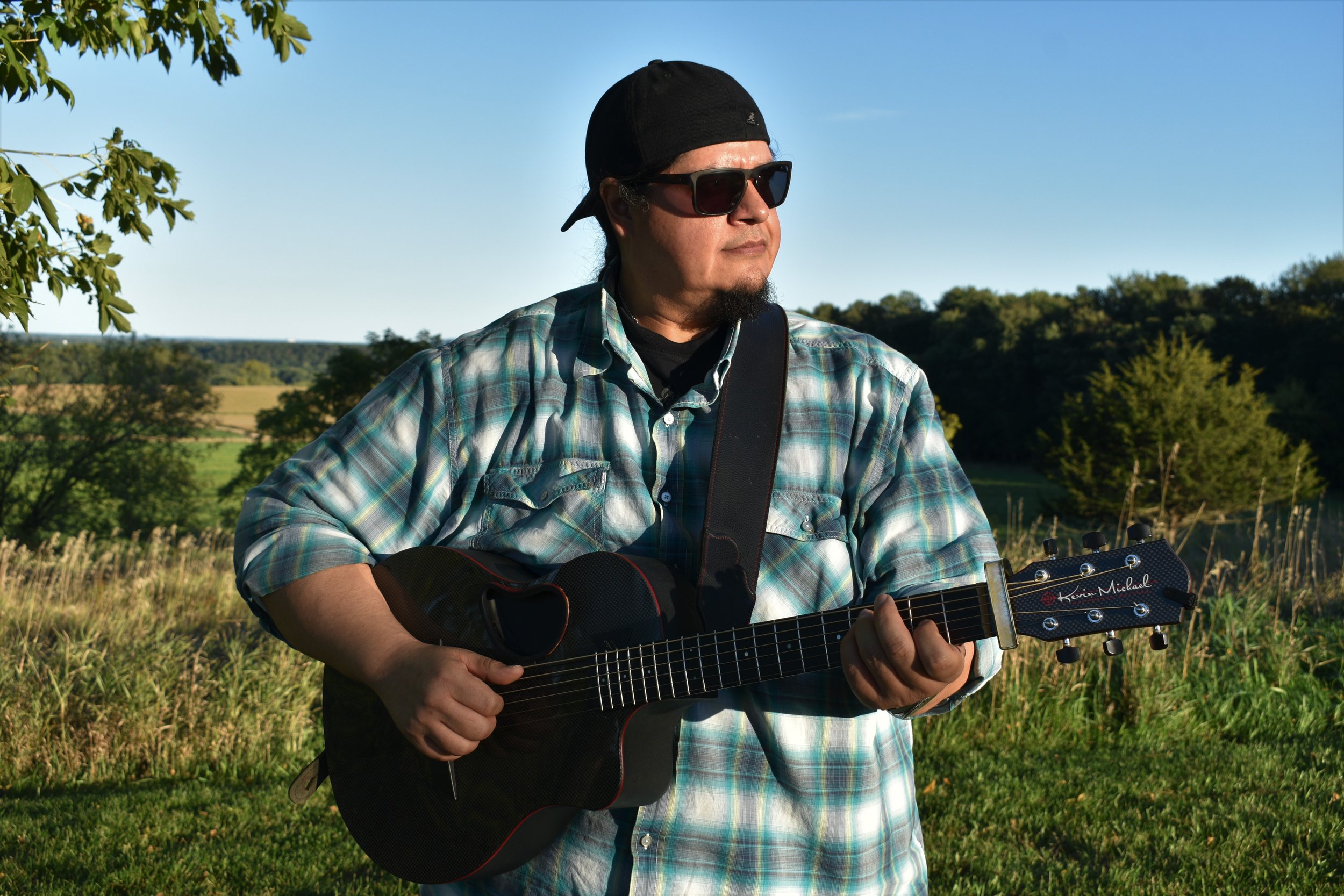
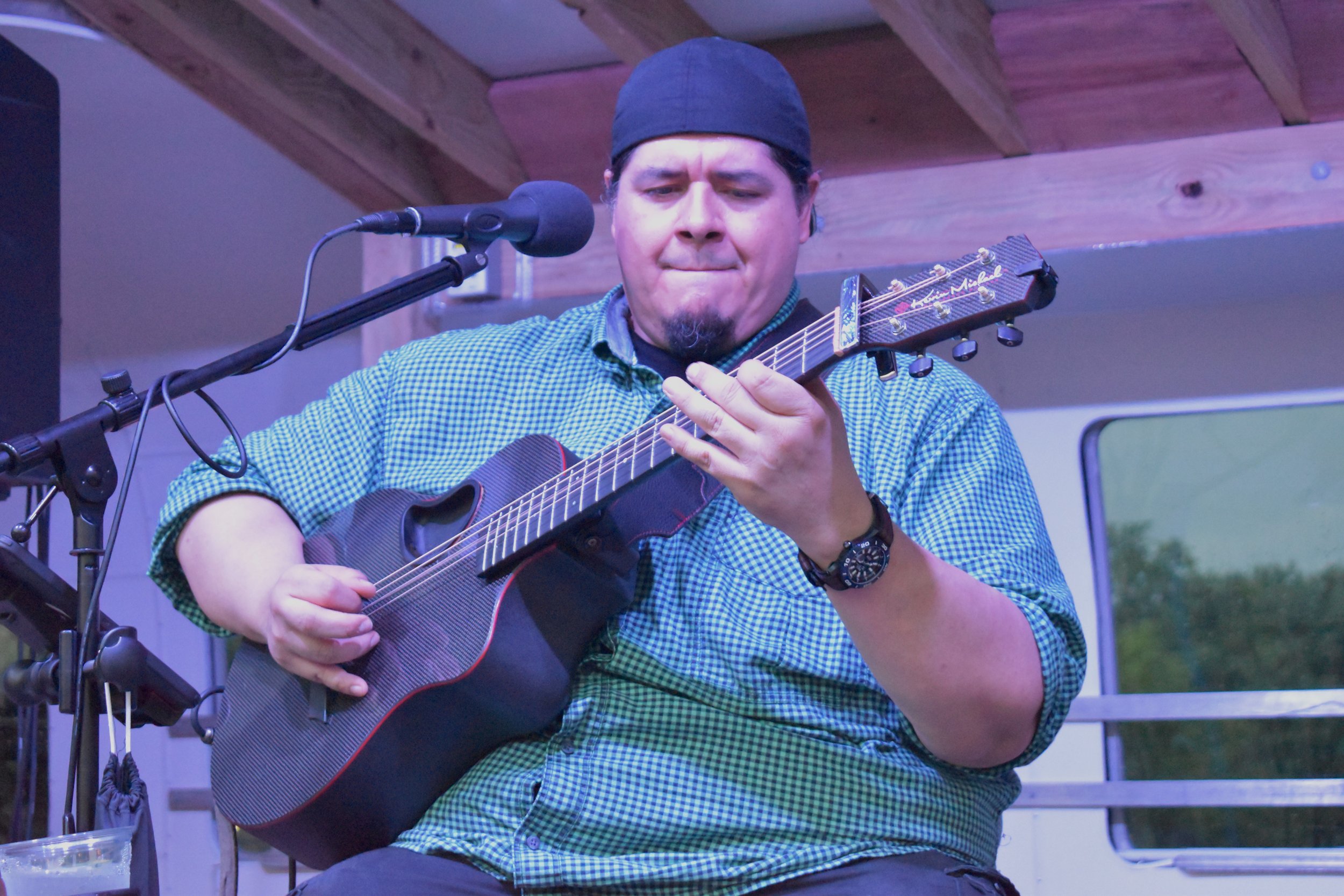
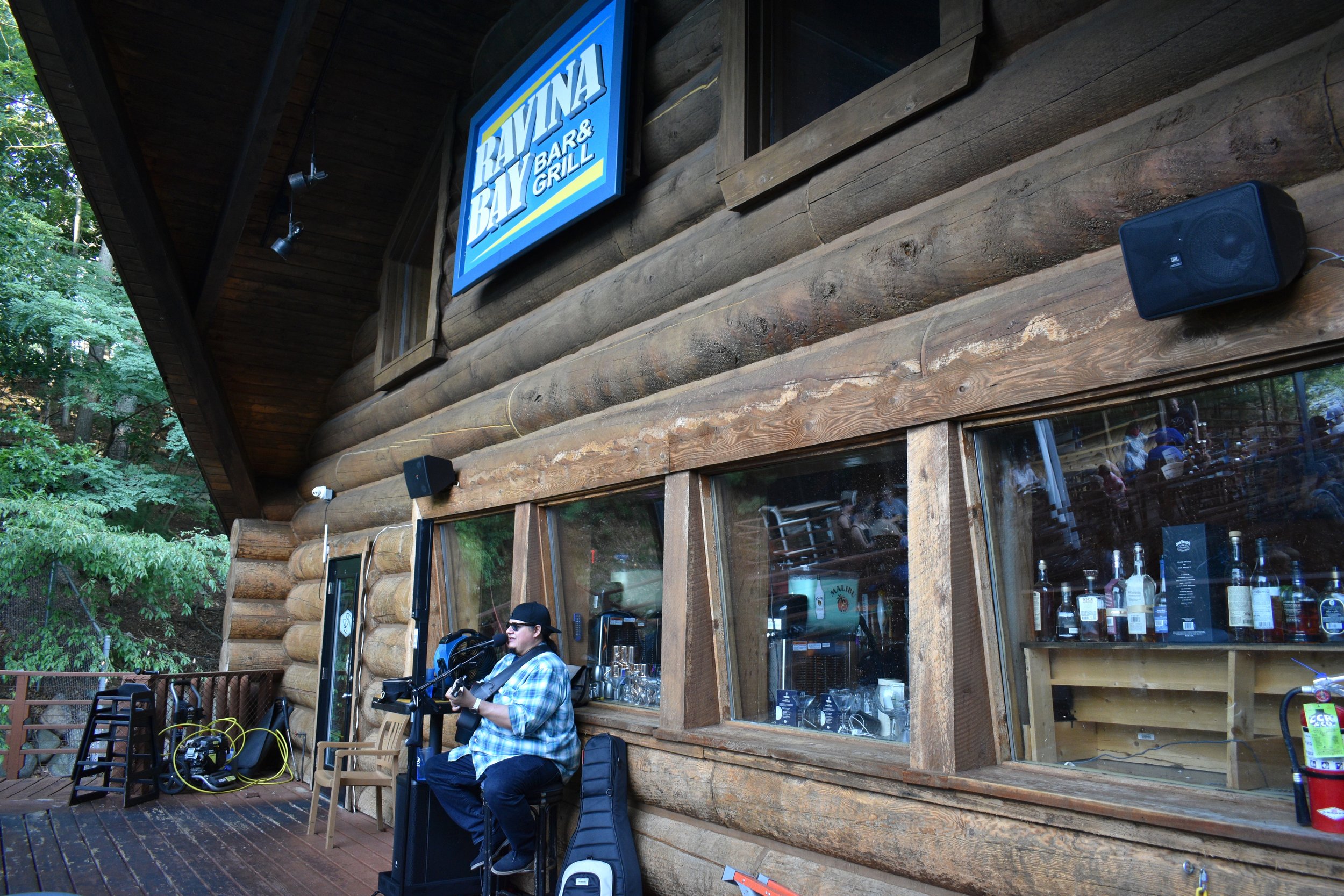
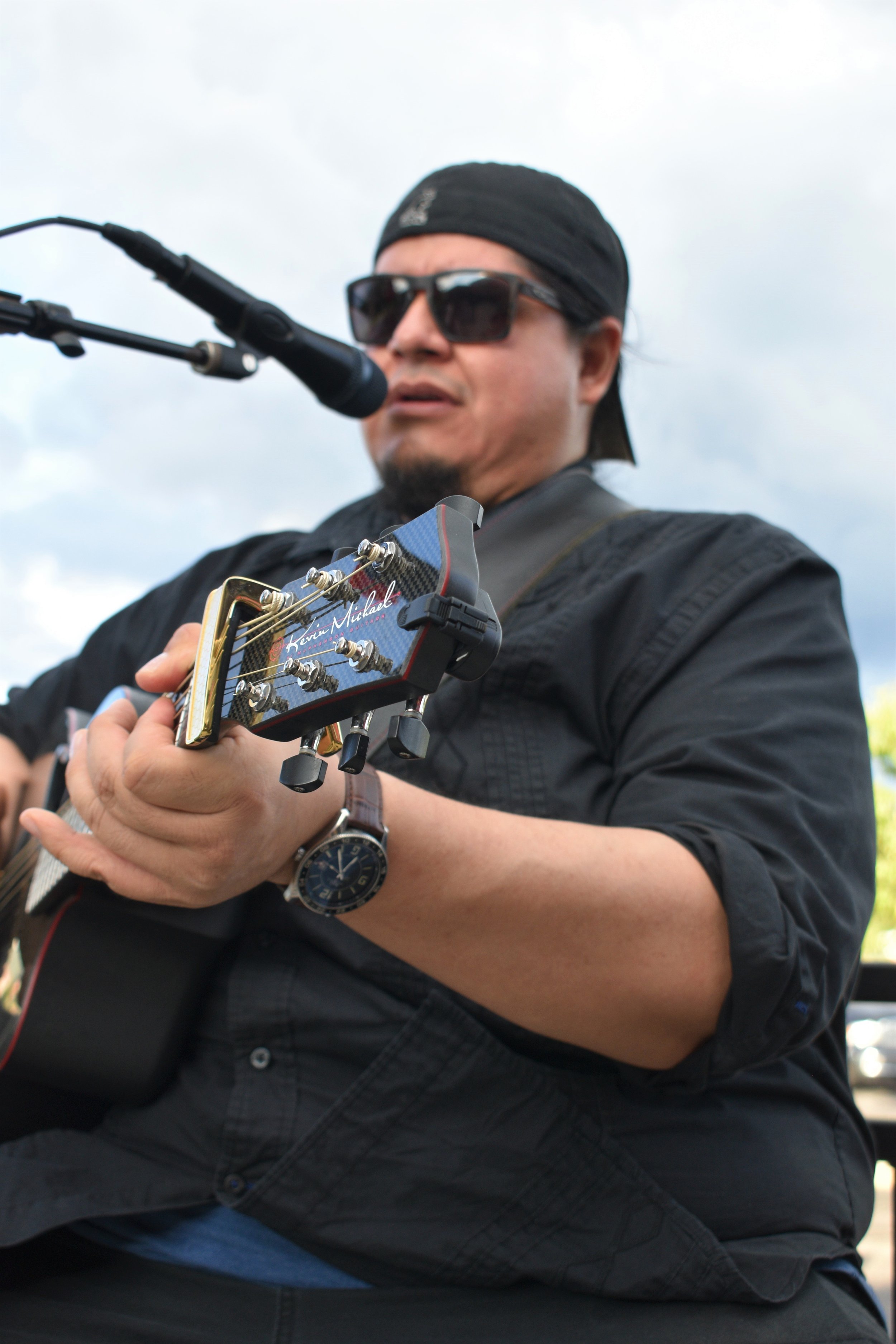
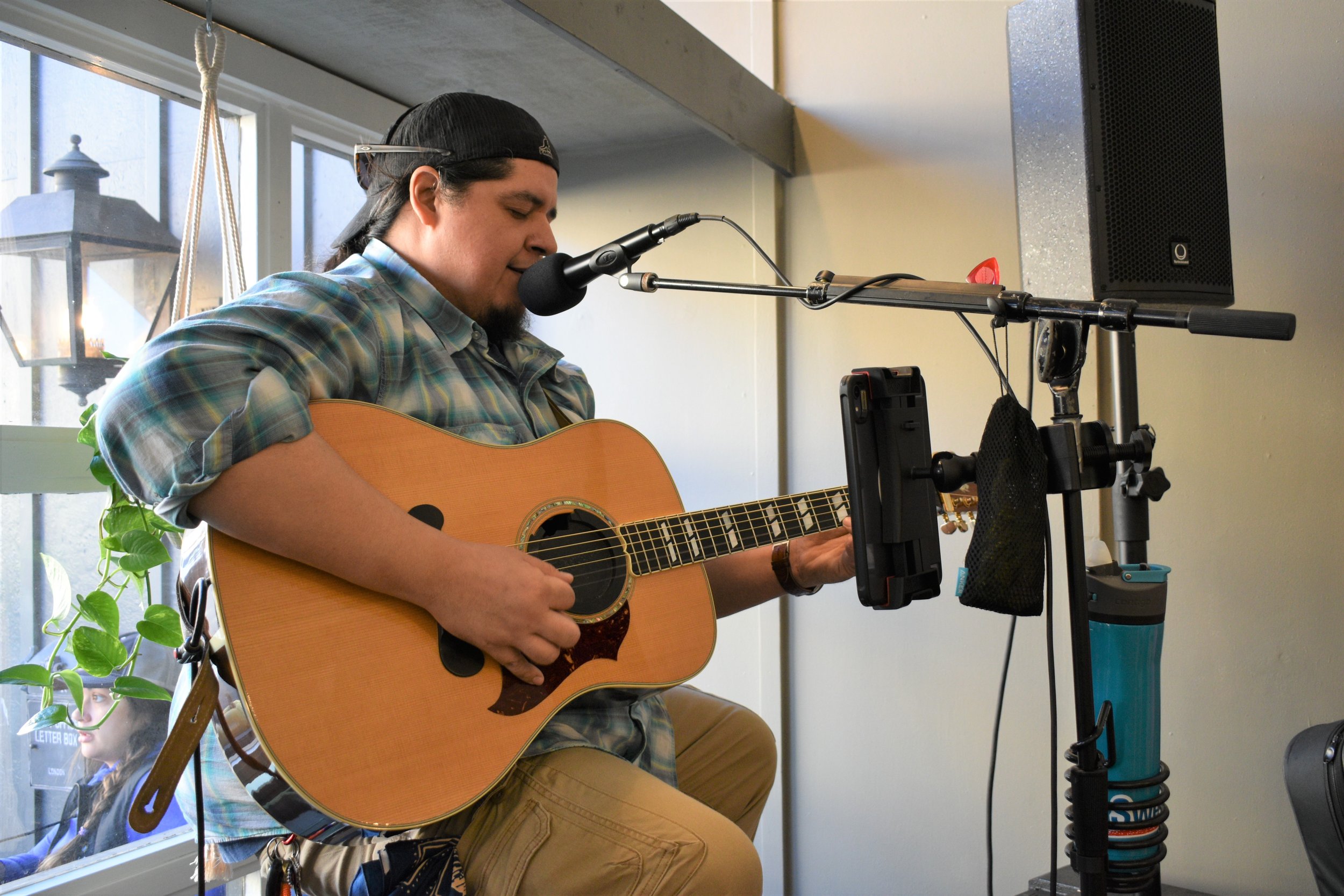
Musician Marc LaMere performs at Monk's Bar & Grill in Lake Delton, Wisconsin. 2023
